Who do you think of when you hear the term “rock music”? The Beatles, The Rolling Stones, Scorpions, Queen, AC/DC? And when you hear the name “punk rock”? Sex Pistols, The Exploited, Ramones, Die Ärzte, Motörhead … These names probably come to mind for everyone reading this text. Those who are well acquainted with the rock scene will surely name several dozen more bands and artists. But let me guess – among them there is not a single band of Russian or Soviet origin. And who do you think of when you hear the term “Russki Rock” or Russian rock music? From most of my German acquaintances I got so far only “Leningrad Cowboys” as an answer. But they are Finns. Did you know that in Siberia, apart from snow and cold, there is also punk rock?
It’s completely okay if you are perplexed now, because Russian rock, punk and especially underground music is first and foremost a Russian cultural phenomenon. Whereby not every Russian is well acquainted with it – this cultural layer lies under the ice, so to speak. In this article we want to dive under this layer of ice and see why Yegor Letov “was always against it”!
“This is your rock ‘n’ roll front and mine”
Quote from a song from Instrukciya po Vishivaniyu
In the USSR, art was thoroughly controlled and censored. Those who thought too freely were not given a stage at best, and their works were not published. Despite the Iron Curtain, the rock virus from the “evil” West managed to penetrate Soviet society. The Soviet power had unsuccessfully tried to fight it. And if you can’t fight something, you have to gain control over it. According to this logic, the so-called rock clubs (or rock labs in Moscow) were created in many cities of the Soviet Union so that the KGB could better observe and control rock musicians. This was obvious. No event was allowed to take place without permission from above. Illegal recordings and performances – the so-called “Kvartirniki” (from the word Kvartira – apartment) – still existed.
There were several scenes that were separated not only geographically but also stylistically. The main hotspots in the 80s were Saint Petersburg and Siberia.
Russian rock music from Saint Petersburg
Saint Petersburg (1924-1991 Leningrad) is known as “Russia’s window to Europe” and is also unofficially called “Russia’s cultural capital”. The city played a similar role in the history of Russian rock music. In the spring of 1984, Californian artist Joanna Stingray visited the USSR for the first time and met Boris Grebenshchikov (you can find pictures of the two here). Boris and his band Aquarium were pioneers of Russian rock. Joanna was so enthralled with Boris, his music and Leningrad that when she returned to the U.S., she only dreamed of coming back – “Back in the U.S.S.R.” as the Beatles sang.
On her next visit, she illegally went to a concert at the Leningrad Rock Club and was targeted by the KGB. And later, in the USA, her frequent trips to the Soviet Union aroused the interest of the FBI. Joanna made it clear that she was pursuing only one goal – to make her Russian friends known in the West. In 1986 she released the album “Red Wave”, which collected songs from four rock bands from Leningrad: Kino, Alisa, Aquarium and Strannye Igry (“Strange Games”). The project, of course, was carried out secretly. Even Mikhail Gorbachev and Ronald Reagan, the then rulers of the USSR and the USA, received a copy of Red Wave from Joanna. The record became so popular that it was sold on the black market for $200 after just a few weeks.
After the successful release of Red Wave, many members of the Leningrad Rock Club became famous in the Soviet Union as well – bands like Kino, Aquarium, DDT, Alisa or Zoopark were officially allowed to perform on the big stages and were shown on TV. From now on they are “legal”. The song “Peremen!” by Viktor Tsoy becomes the unofficial anthem of perestroika. Also in recent years you can hear the song more and more often.
Boris Grebenshchikov, Viktor Tsoy and Co. were lucky that their music had broken Joanna’s warm Californian heart. But not all musicians in the rock scene had a chance to get such contacts. There were many bands that were mostly known only locally in the city or even within a neighborhood, and they could never count on great success. This was not necessarily due to a lack of potential or talent, because some did manage to break through. One of my favorite bands of the Soviet era is Jugo-Zapad (“South-West”), which came from my neighborhood. The band existed only three years (1988 to 1991). But they were able to perform at a festival on one of the biggest stages in Saint Petersburg, the Yubileyn Sports Palace, as the following video shows:
The cherry on the cake for them was a concert in Amsterdam. Afterwards, punks from the distant outskirts of the Capital of Culture stopped making music together. Igor Frolov, the co-founder of the band, moved to Finland, where he still lives. He now visits his hometown only sporadically.
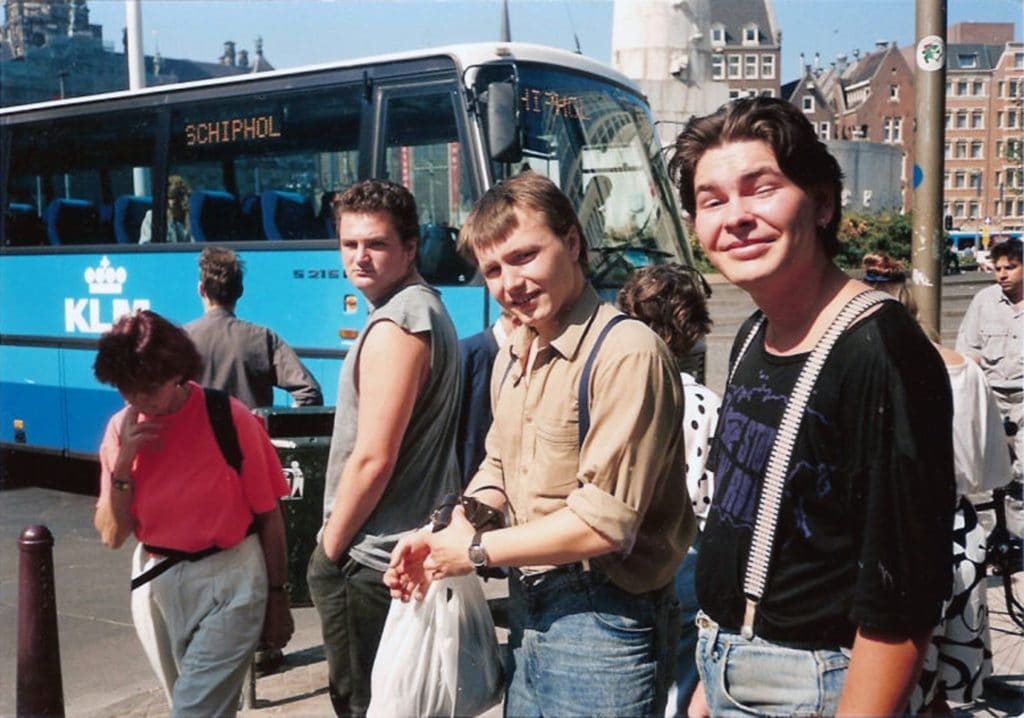
Another Leningrad native, Andrei “Svinya” (“Pig”) Panov, is considered by some researchers to be the first Soviet punk. But he described himself and his companions as “idiots”. Even in school he had problems because he was the son of a supposed enemy of the people – in 1973 his father emigrated to Israel. Similar to emigration from the GDR to West Germany, this was considered treason against the people in the USSR. Apart from that, Jews were basically not popular in the Soviet Union. According to rumors, a few years later Svinya wrote in his passport next to the word “Russian” “this is not true, I am a Jew” (in the Soviet passport there was the column “nationality”).
“The worst thing for me would be if I could no longer do two things – drink and sing”, Svinya said. Besides alcohol issues, he often had problems with the police because of his provocative appearance. For example, it could happen that he appeared on stage completely naked or that he took off his pants in the middle of the street and did his business.
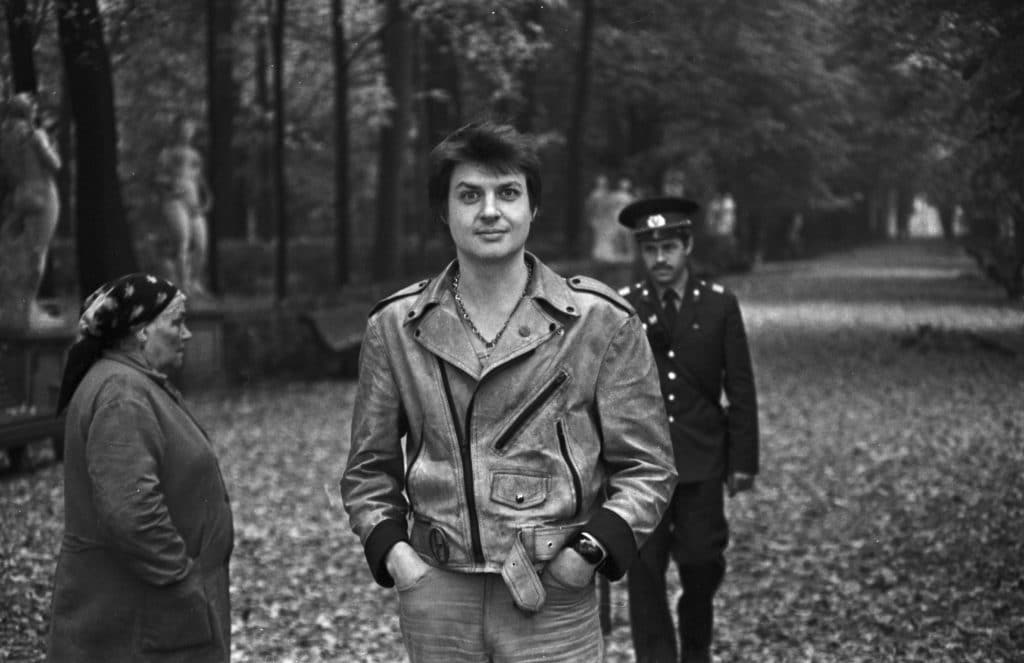
Leningrad was the Rome of the Soviet Union for many rock musicians in the 80s – all roads led there. “Saint Petersburg is the only city in the USSR where the band Grazhdanskaya Oborona can live normally” said Arkady Klimkin, the former drummer of one of the most famous Siberian punk bands, in an interview. Living normally at least meant not being constantly beaten by gopniki (Russian colloquial for “chavs”) as soon as you left the house. But even though the city was attractive to many, Leningrad rock club artists were not always considered colleagues and kindred spirits.
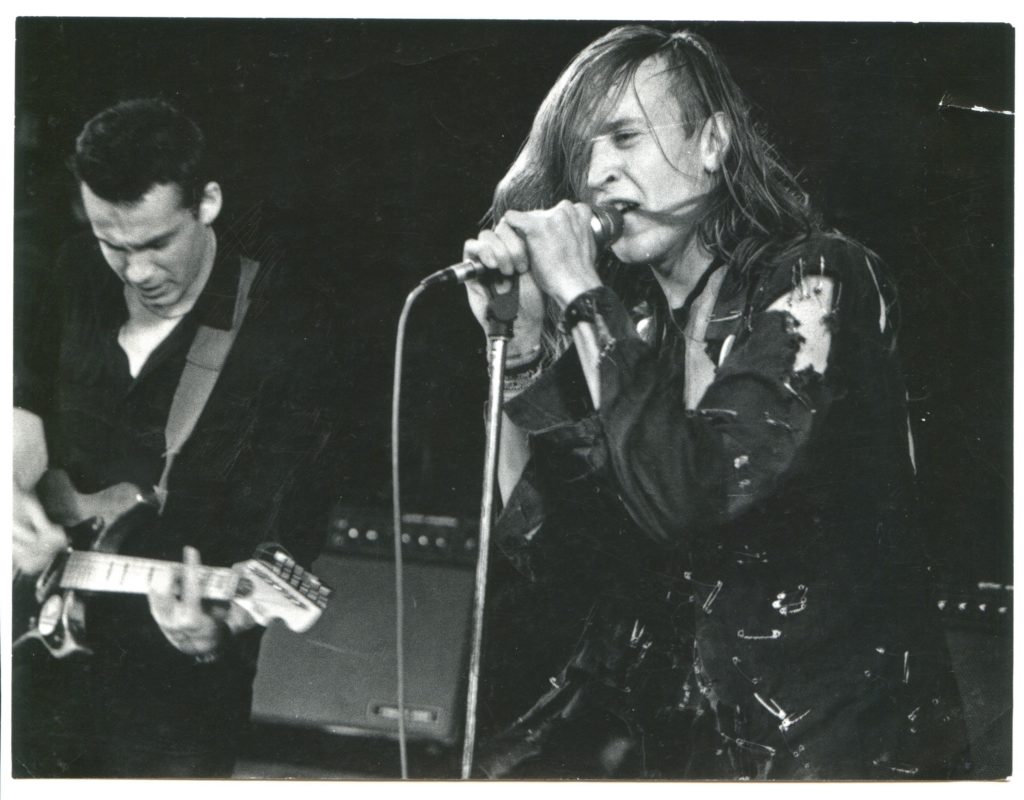
Russian rock music from Siberia
Life in Siberia was not as easy and cozy as in Leningrad or Moscow, which also affected the scene there. The music and lyrics sounded much harder than those of the neo-romanticists and intelligent freethinkers from Petersburg families. In Siberia it was about protest against the reality in and with which they lived. There were three centers of punk culture there: Novosibirsk, Tyumen and Omsk. One of the main figures was Yegor Letov from Omsk, whose name is the first that comes to mind even today when one thinks of Russian punk.
On November 8, 1984 Yegor together with Konstantin “Kuzya UO” Ryabinov founded the band “Grazhdanskaya Oborona” (Civil Defense). Already a few months later all musicians who had something to do with the band were blackmailed by the KGB: Most of them had to sign not to cooperate with Yegor anymore. Kuzja UO was sent to the army in Baikonur within a day, despite a heart failure, and Yegor ended up in a psychiatric hospital. He later describes the time he spent there as the most difficult of his life. But he survived it, and between May and June 1987, with even more anger at Soviet leaders, he released no less than five albums. He did the whole thing alone in his apartment: Kuzja was still in the army at that time and everyone else was afraid to work with Yegor.
In the same year, Yegor performed at a festival in Novosibirsk and then got into trouble again. After the scheduled check-up appointment at the psychiatric hospital, he realized that he was about to be locked up again and fled. Together with his companion, Novosibirsk rock singer Yana “Yanka” Dyagileva, Yegor left his hometown of Omsk and spent several months in all possible corners of the Soviet Union with her. When he returned in early 1988, the situation changed – dissidents like him were now no longer as much in the focus of the rulers as they had been earlier. Perestroika and liberalization were in full swing.

As long as free art was banned in the USSR, musicians were forced to gather in cellars. In the course of perestroika, they were able to slowly emerge from the darkness into the light. Thus, some became famous throughout the Union, while others continued to remain underground. In 1990, Yegor Letov appeared at the memorial concert in memory of Aleksandr Bashlachev (a famous rock musician from Cherepovets, died in 1988) and was very critical of the artists from Moscow and Leningrad – Yegor believed that they had turned the local rock scene into pop and thus destroyed it. His struggle was never to end.
“In search of a subject for a new song”.
Quote from a song from “Kino”
In the early 1990s, a new era dawned in Russia: The eternal Soviet empire had collapsed after all. Russki Rock lost three important figures – in 1990 Viktor Tsoy died, and in 1991 Janka and Maik (Mikhail “Maik” Naumenko, leader of the Leningrad band Zoopark) too. For many the question “what now?” arose. Yegor Letov and his fellow fighter from Tyumen, Roman Neumoev, the founder of Instrukciya po Vizhivaniyu (“Instructions for Survival”), took a break for a few years for various reasons.
Leningrad rock club closed its doors, such organizations were no longer needed. Firstly, because the artists found their audience on other stages, and secondly, because there is no longer any control from above – everyone is allowed to sing whatever they want. In 1991 the club Tamtam opened, which quickly became the most important place for the Petersburg underground scene. But not everyone fits in here, the idea is to create a club free of gownorock (“shit rock”). The audience is very colorful – punks, skinheads, freaks and junkies. This often leads to escalations – brawls are the order of the day.
Moreover, new faces appeared, because – as they say in Russia – a holy place never remains empty. Kazakhstan 1992: Yermen “Anti” Yerzhanov founded the band Adaptacija in Aktyubinsk (since 1999 Aktobe). At that time many tried – and still try – to imitate the style of Yegor Letov. Although Jermen is also inspired by Letov and Bashlachev, he develops his own style – Jermen is a punk poet (as he calls himself). Most concert-goers in the 90s were students and schoolchildren, workers and unemployed – but underground was never the music of celebrities.

At the end of 1993 Yegor Letov returned to the stage with the new project “the Russian Awakening”. The reason: Yegor had a new enemy – Boris Yeltsin. The project was promoted together with Roman Neumoev, Oleg Sudakov, other musicians and the founder of the National Bolshevik Party of Russia, Eduard Limonov. The project included a series of concerts in Moscow, Saint Petersburg, Tyumen, Novosibirsk, Rostov-on-Don, Saratov, Tver, Kiev and Lugansk.
Similar to the 80s, the underground scene now faced not only the music mainstream, but also the political mainstream. Yegor, who used to sing “I hate red paint, destroy people like me” (as an accusation against a KGB agent), now says to Limonov, “More red, Eduard, more red!”
National Bolshevism was the only conceivable alternative to Yeltsin for many (especially younger generations) at that time. Limonov attempted to reconcile left-wing and right-wing ideas. This often led to internal contradictions. Members of the NBP (National Bolshevik Party) were often present at rock concerts in the early 2000s. Adaptacija was also popular among some of them: they liked Yermen’s songs and welcomed his internationalism. Others rejected him for the same reason and because of his Kazakh origin.
The figure of Yegor Letov is even more multifaceted: for some he was too left-wing, others accused him of fascism and anti-Semitism; some found him too obstinate or, on the contrary, too vacillating in his convictions; too antisocial and too radical; too philosophical and difficult to understand, too primitive and shallow. Some disliked him because he was a member of the NBP or because he broke away from the idea of National Bolshevism and was apolitical for the last years of his life. He probably didn’t care about all that.
“Rock-‘n’-roll is dead, I’m not yet”.
Lyrics from “Aquarium”
It is time to write a few words about the Russian capital. Many Russians perceive Moscow as a separate state, because life there is very different from life in the rest of the country. In Moscow itself there is a joke: “Outside the Moscow Ring there is no life, there is only Petersburg, where it is wet and melancholic”. Moscow was (and is) an important source for the scene – large and modern venues, a rich(r) audience, a wide range of musical instruments and records, which are not available in any other city, characterize the metropolis. But the Russian capital is not actually known for its own notable underground scene. Nevertheless, it would be wrong to say that there is no Moscow underground – in Moscow there is everything.
But what actually is underground? This word has been used so often here without giving a definition. According to what criteria, for example, would a German authority decide what may be called underground and what may not? Since there are no test procedures, certificates or testimonials that prove belonging to the underground, authorities would be overwhelmed with such a task. “Those who don’t want to be on TV belong to underground”, “underground ends where the public starts”, “there is forced underground and underground on principle” – these are the opinions of some artists who are usually counted as underground. I would add to it and call underground an antonym of mainstream. To make the difference clear, I want to present you two examples from the Moscow music life.
“Formation” – this term comes from Boris Usov, the frontman of the Moscow band “Solomennye Enoti” (“Straw Coons”) and is used to describe Moscow’s independent musicians. It is not an alternative term for the underground scene, because there is no real scene. It is rather about individuals, around whom relatively small – about 30 to 40 people – but firm circles of fans and friends are formed. Concerts therefore usually take place in small clubs or in private homes – the so-called “Kvartyrniki”, which have been known since the 70s and 80s. Now, however, the concerts took place here because it simply fit in terms of size.
Concerts were also held in the bunker of the National Bolshevik Party. Ilya “Santim” Malashenkov, whose band “Banda Chetyrjokh” (Gang of Four) had also participated in the “Russian Awakening” in the 1990s, was an active member of this party. I would like to emphasize that none of the artists named here has anything to do with the right-wing rock known in the West (it also exists in Russia, but in very marginal forms). The affinity of the musicians to politics at that time has to be seen in the context of the time. The 90s in Russia were times of so-called red-brown ideas – a spectrum that ranged from communism to fascism.
The song lyrics of the 90s often reflected political ideas that some authors actively opposed a few years later. They were nothing more than an attempt to protest against reality. Concertgoers of Grazhdanskaya Oborona said they didn’t care if the band were fascists or communists – the most important thing was that they expressed the same emotions they did. Mind you, no musician that this text has been about so far was persecuted or convicted in court after the fall of communism because of his actions or statements in Russia.
Besides Boris Usov and Santim, there were other names worth mentioning: Valentin “Jack” Sokharev (from the band “Medved Shatun”, “Sleepless Bear”), Yulia Teunikova, Alexander “Bogus” Bogomolov and, of course, Pavel “Kleshch” Klishchenko, who died in 2009. There are definitely others, but they are even deeper under the ice.
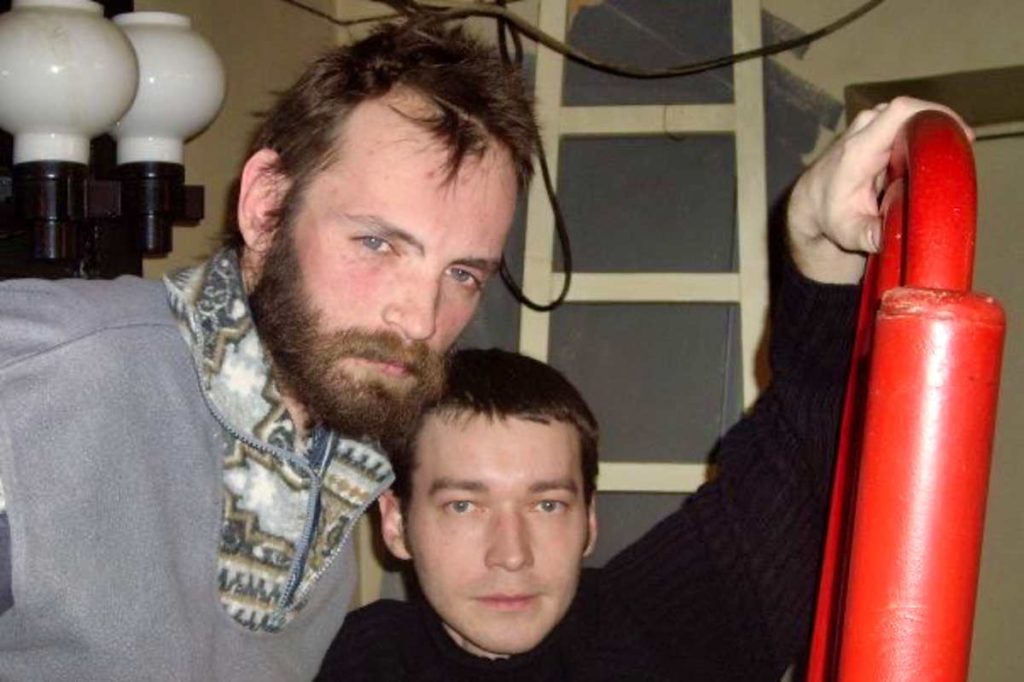
At the end of the 90s, the term “rockapops” emerged in Russia, which is a good way to describe the Russian rock mainstream of the time. Politics, social issues, protest – these topics were no longer up-to-date. The focus was put on new forms and directions of music. Many bands were inspired by Western artists and partly copied their melodies. This had also happened earlier in Russian rock music.
Besides the possibility of regular concerts and mass production of albums on CDs, “Nashe Radio” (“Our Radio”) was founded in December 1998 with the support of the Russian oligarch Boris Berezovsky. The founder Mikhail Kozirev wanted to create a station where only Russian music was played, including not in the format offered by “Russkoe Radio” (“Russian Radio”), because there only pop songs and hit songs are heard. Mikhail himself decided who he wanted as an artist. Yegor Letov was banned from Nashe Radio for a long time because of a line in an old song.
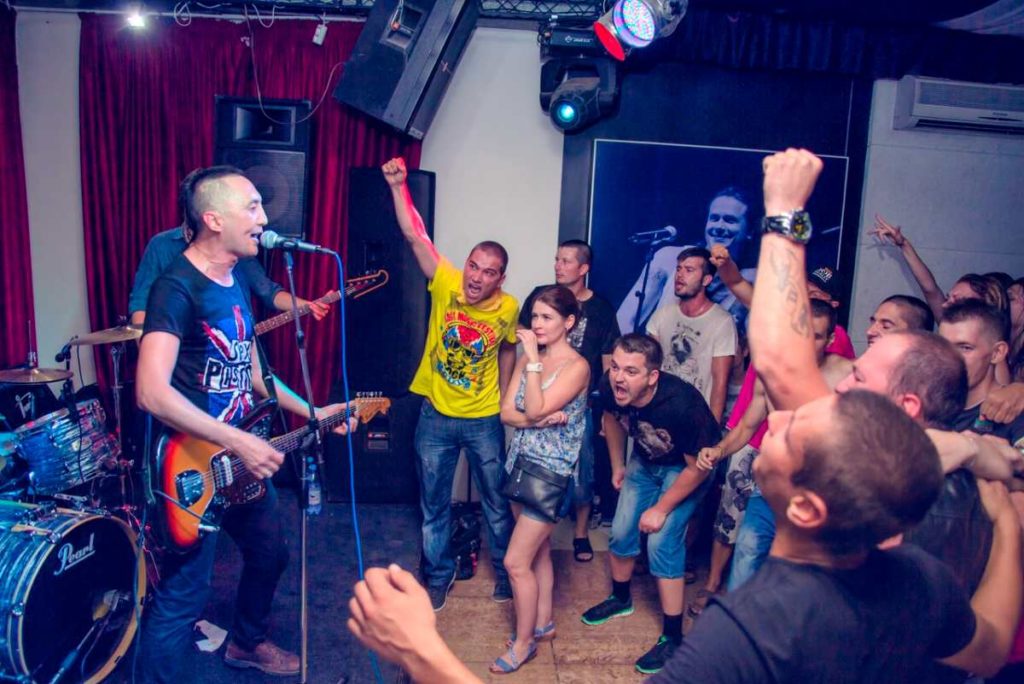
Since 1999, “Nashe Radio” has organized the festival “Nashestvye” (“Invasion”), which is now held annually and has become the largest rock festival in Russia. The rock underground also had (had) its own festival: in 2001–2008 and 2015–2017 “Sukhovej” (“Desert Wind”) was held in Aktobe, Kazakhstan. While Naschestwie was visited by 200,000 people in 2015, Sukhovej was visited by only about 200 people in the same year.
One can debate at length whether the quality of music can be determined on the basis of the number of concert visitors, CDs sold or increased sales. Viewed quite subjectively, everything is ultimately a question of taste. Suum cuique.
“Widely famous in narrow circles”
Russian saying
Whether mainstream or underground, touring is an important part of musical life. Not only rock stars, but also relatively unknown artists can be known far outside their home (cities), but in much narrower circles. In 1999 Grazhdanskaya Oborona performed its first foreign concert in New York.
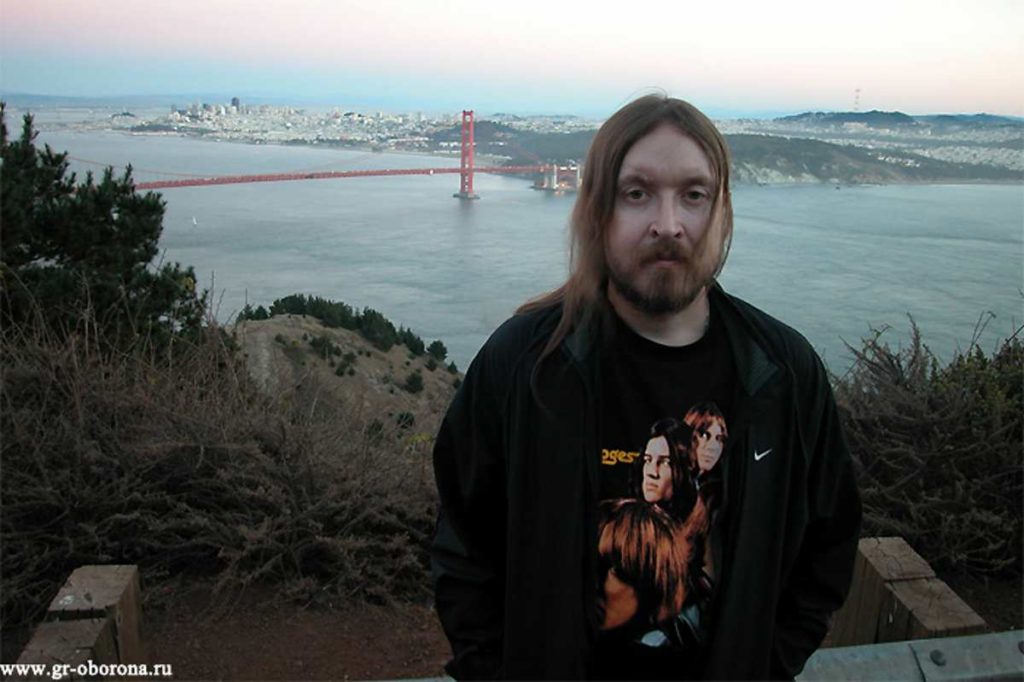
From 2000, Yegor Letov gave a total of five club concerts in Berlin, Nuremberg and Munich, alone or with the band, and also played in California, Israel and Norway. Until his death in February 2008, Yegor took every opportunity to give concerts.
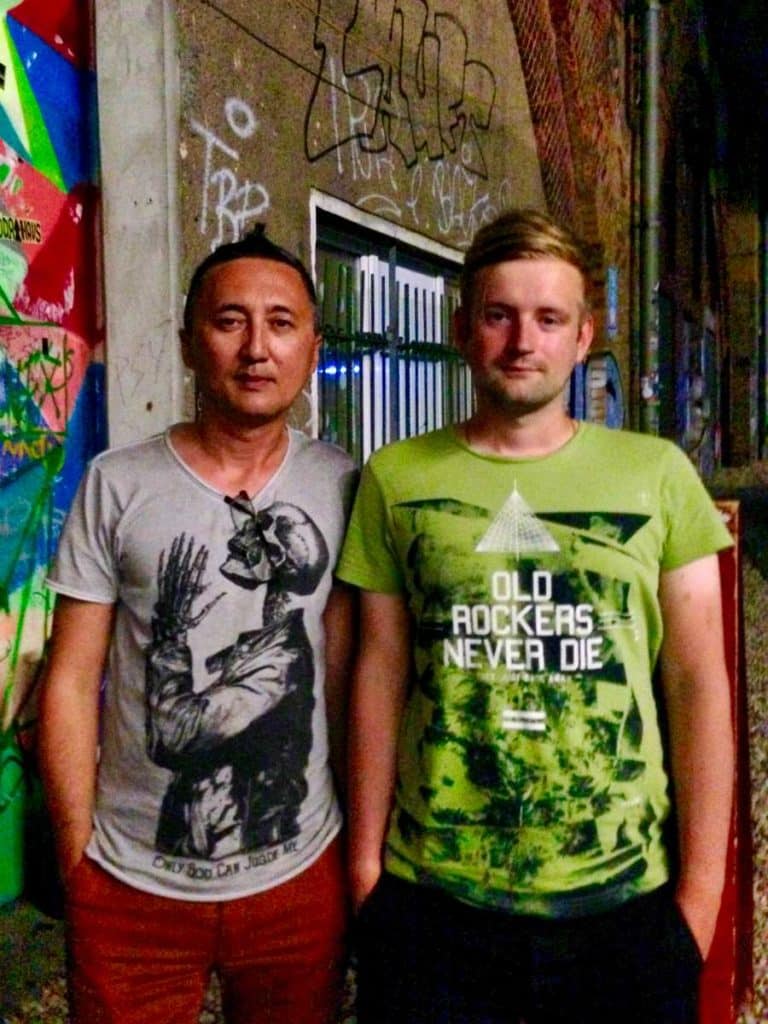
In 2002, Yermen and Denis Tretyakov, the founder of the band “Tserkov Detstva” (“Church of Childhood”) from Rostov-on-Don performed in Germany for the first time. Free and cosmopolitan Berlin, known for its own underground scene, also attracted Russian underground artists. Many like to perform in the German capital, although it was connected with various difficulties. Apart from financial issues, it was not easy for everyone to get a visa, especially for the Kazakh Yermen. Despite all the circumstances, Yermen and Adaptacija, besides Germany, played several times in France, Spain, Finland and Switzerland.
In the winter of 2019, Denis Tretyakov played his last concert to date on the stage of the Berlin club Hangar 49 together with Kristof Hahn, the Berlin-based guitarist of the US rock group Swans. Hopefully Denis will come back, the legendary Hangar has unfortunately been closed since last year. For once, not because of the Corona pandemic.
Also well-known in Germany is the Russian prose writer Mikhail Yelizarov, who studied and worked in Hanover and Berlin between 2001 and 2007. Although Mikhail is known primarily as a writer, he is also active as a musician. He describes his songs himself as “bard-punk-chanson”. Almost every month Mikhail plays in small clubs in Moscow and Saint Petersburg, for about 150 visitors. A proud number for solo concerts of an underground artist.
Since the mid-2000s, another Russian rock bard who has worked with Kristof Hahn has been traveling the country alone with his guitar: Branimir (Alexandr Parshikov).
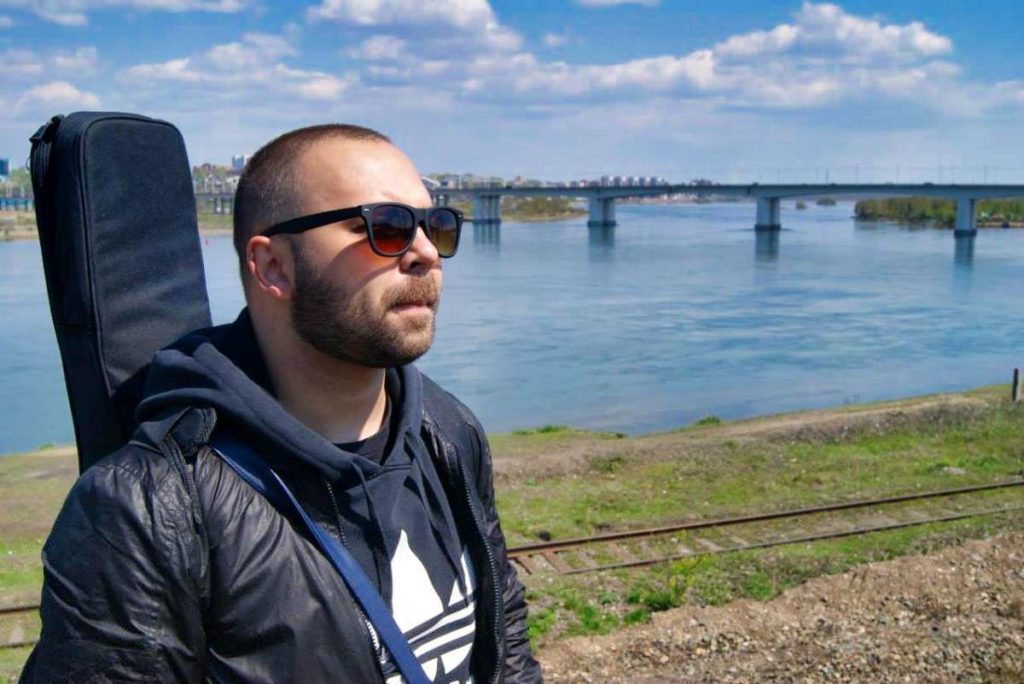
“What I do is dark folk of the Russian province: an apocalypse of our empire ” – says Branimir.
But not all musicians are so active. The Siberian musician Aleksandr “Agnijar” Podorozhnij spends his life in the Altei Mountains and hardly ever gives concerts. “Russian-Siberian mystical-shamanic rock-acoustic” – that’s how he defines his music. I was lucky enough to have seen Agnijar at the 2014 Yanka Memorial Festival in Novosibirsk:
Whether we like it or not, the Internet is playing an ever greater role in our lives and has become an important communication channel alongside “classic” concerts. In 2013, Konstantin “Stupa” Stupin, the so-called “last punk of Russia,” is released from prison. After an unsuccessful attempt to reanimate his old band “Nochnaja Trost” (“Nocturnal Stick”), he continues his music career alone. With the help of Youtube and a few dedicated fans, he becomes known nationwide within a few months.
Stupa had a typical punk youth and got not only several years in jail, but also all sorts of diseases. The last punk of Russia died in 2017, 19 years after the death of the first Soviet punk Svinya.
“The time for poems is over”
The last song on the last album of “Adaptacija” released in 2019 is titled “The time of poems is over”. After 27 years Yermen disbanded his band and after a short break continued his career alone.
The last concerts of Adaptacija were a grenade: Never since 2005 have I seen so many visitors at the concert of an underground band as in Moscow. But Yermen is right – the time of poems is indeed over. The time, but not the poems. While writing this post, I have often wondered how many people I write about have already passed from life. Their legacy, however, remains. There are two labels in Russia – Vyrgorod and Mashina Records – that restore old recordings and release new ones that have not yet appeared. In 2018, the Museum of Siberian Punk Rock was founded in Novosibirsk and recently moved to Moscow.
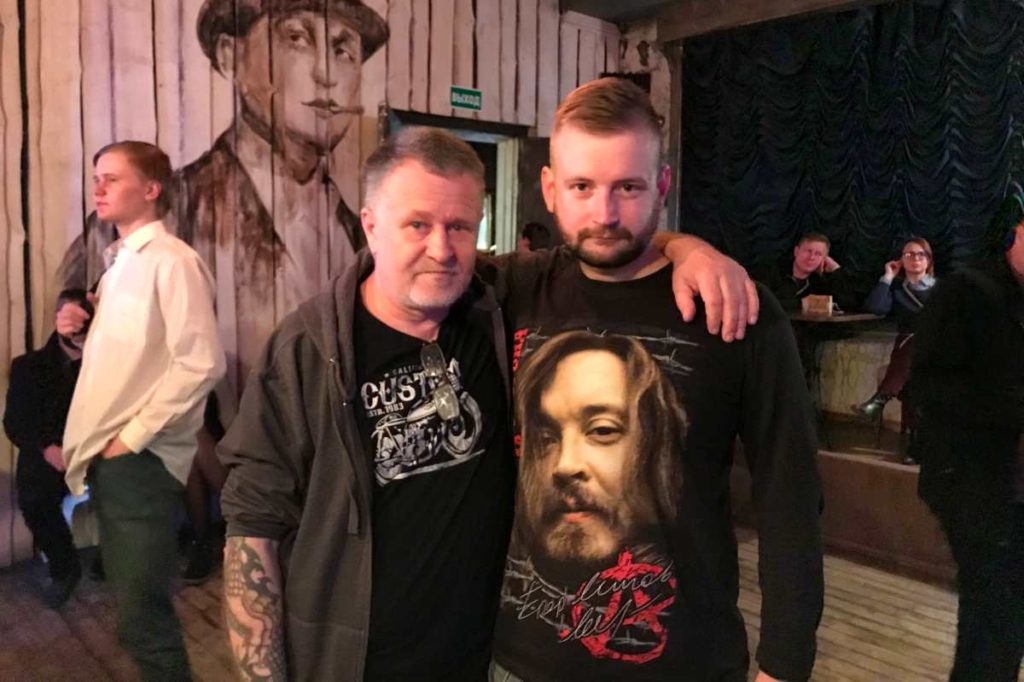
There are also plenty of new books about Russian rock music, written as an attempt to digest what has happened or simply for nostalgic reasons. Also, since 2014, the Letov Seminar has been held every year at the Russian State Humanities University in Moscow. And even if the number of unnecessary cover projects or reunions is increasing many years after the death of the bandleaders and a new generation interested in counterculture listens to rap rather than guitar rock, I am very grateful that there are still lone fighters like Yermen, Branimir, Mikhail Elisarov, Denis Tretyakov or Oleg Sudakov who stay “afloat” and keep going. I would like to thank them very much for that. Many thanks also to the artists for their kind permission to reprint.



